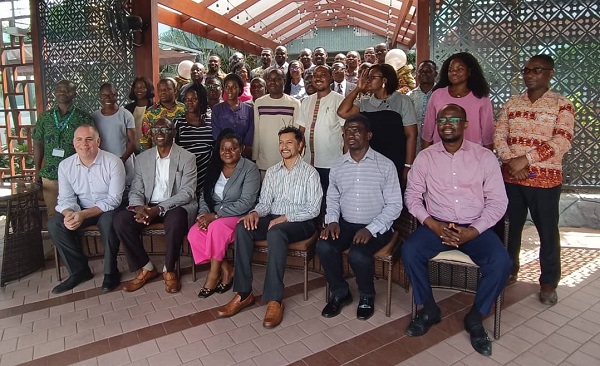Ghana will from next year begin tracking and publishing data on its natural capital, thanks to a two-day training workshop organised by the Ghana Statistical Service in collaboration with the Environmental Protection Agency (EPA), the Ministry of Environment Science, Technology and Innovation (MESTI) and the United Nations Environment Program-World Conservation Monitoring Centre (UNEP-WCMC).
The inception workshop on Capacity Building on Natural Capital Accounting (NCA) for Sustainable Development and Decision Making opened on January 12, 2022, in Accra.
It was held to provide participants with a methodology and procedures to compile and publish a Natural Capital Account, which is crucial in measuring a country’s wealth and sustainable development. Funded by the United Kingdom Darwin Initiative, it will be completed in March 2024.
The project will be implemented using the System of Environmental-Economic Accounting Ecosystem Accounting (SEEA EA) framework.
The SEEA EA is a statistical standard to organise information on the state of ecosystems and the services they deliver to the economy and society. It has been produced under the auspices of the United Nations Statistics Division to complement the System of National Accounts and was adopted as an international statistical standard in 2021.
In an interview on the sidelines of the workshop, Edward Esuo Afram of the GSS said NCA would enable his outfit to produce Gross Domestic Product (GDP) figures which would take into account natural resources.
He said this would enable the country to account for how much its natural resources contribute to its GDP and generate policies to safeguard the use of its natural resources.
In his speech, the CEO of CSIR-Technology Development and Transfer Centre, Dr. George Owusu Essegbey, emphasized the importance of natural capital accounting in the fight against illegal mining, which he said was causing enormous environmental damage to the nation.
He also highlighted the significance of natural capital accounting in the context of the Global Biodiversity Framework and the Kunming-Montreal Agreement, which was adopted by governments in December 2022.
Dr. Essegbey mentioned the efforts made in the past in this regard, such as the CONNECT Project, which aimed at Mainstreaming Biodiversity information at the heart of decision-making in Ghana, and the research estimates the cost of reclamation of lands and restoration of water bodies in the Western Region to be $250 million.
He also commended the Ghana Statistical Service for boldly taking the leadership position in the implementation of the Natural Capital Accounting project in Ghana.
He said: “Natural capital accounting is very important for every country that seriously wants to achieve sustainable exploitation of its natural resources. Costa Rica is a country that is cited for one of the best examples of strategizing for nature restoration. Between 1943 and 1983, Costa Rica lost about 50% of its rainforest resources. Currently, through the implementation of various national policies and strategies and with the collaboration of key stakeholders, Costa Rica has been able to halt the loss and restore 60% of its rainforests. It has one of the highest percentages of protected land – 26%. In 2019, the UN named Costa Rica the Champion of Earth for its efforts in climate change action and protecting nature.
“What Costa Rica has done is not beyond Ghana. A core pillar in emulating the Costa Rican example is generating the data for evidence-based planning in our management and exploitation of nature. The decision-makers in our relevant ministries and agencies and indeed at the Presidency must have the researched data and statistics pertaining to our biodiversity resources. In fact, there must be a genuine paradigm shift in our economic planning, from the over-reliance on purely economic and monetary information to the appreciation of the value of nature in its tangible and intangible dimensions”.
For his part, the Principal Programmer Office, National Focal Point/Accra, Kwame Fredua said it had become increasingly evident to the government and the citizenry that reliable and timely data and information on the environment and natural capital was vital to inform these strategic actions and decisions at all levels.
He added that indicators such as the Gross Domestic Product (GDP) had not adequately told the “hidden stories” of the growth process concerning social inclusion, the flow and stock of natural capital, the explicit and intrinsic costs of environmental degradation and the unsustainable exploitation of natural capital.
“Environmental Protection Agency, working with critical institutions like the National Development Planning Commission (NDPC), Ghana Statistical Service, and the Ministry of Finance, among others recognize the need to strengthen capacity in the valuation of natural capital and its use in development planning and policy decisions. This recognition and determination have brought us here today,” he said.
“The EPA is confident in this partnership with the Darwin Project and the Ghana Statistical Service, and we expect that the set objectives of the Project will be realized”.
The workshop brought together experts from various fields, including environmental scientists, economists, and statisticians, to discuss the importance of natural capital accounting and to learn about the latest methods and techniques for data collection and analysis.
“We are excited to be part of this initiative, which will give us a better understanding of our natural resources and how to use them sustainably,” said one of the workshop attendees, an environmental scientist.

